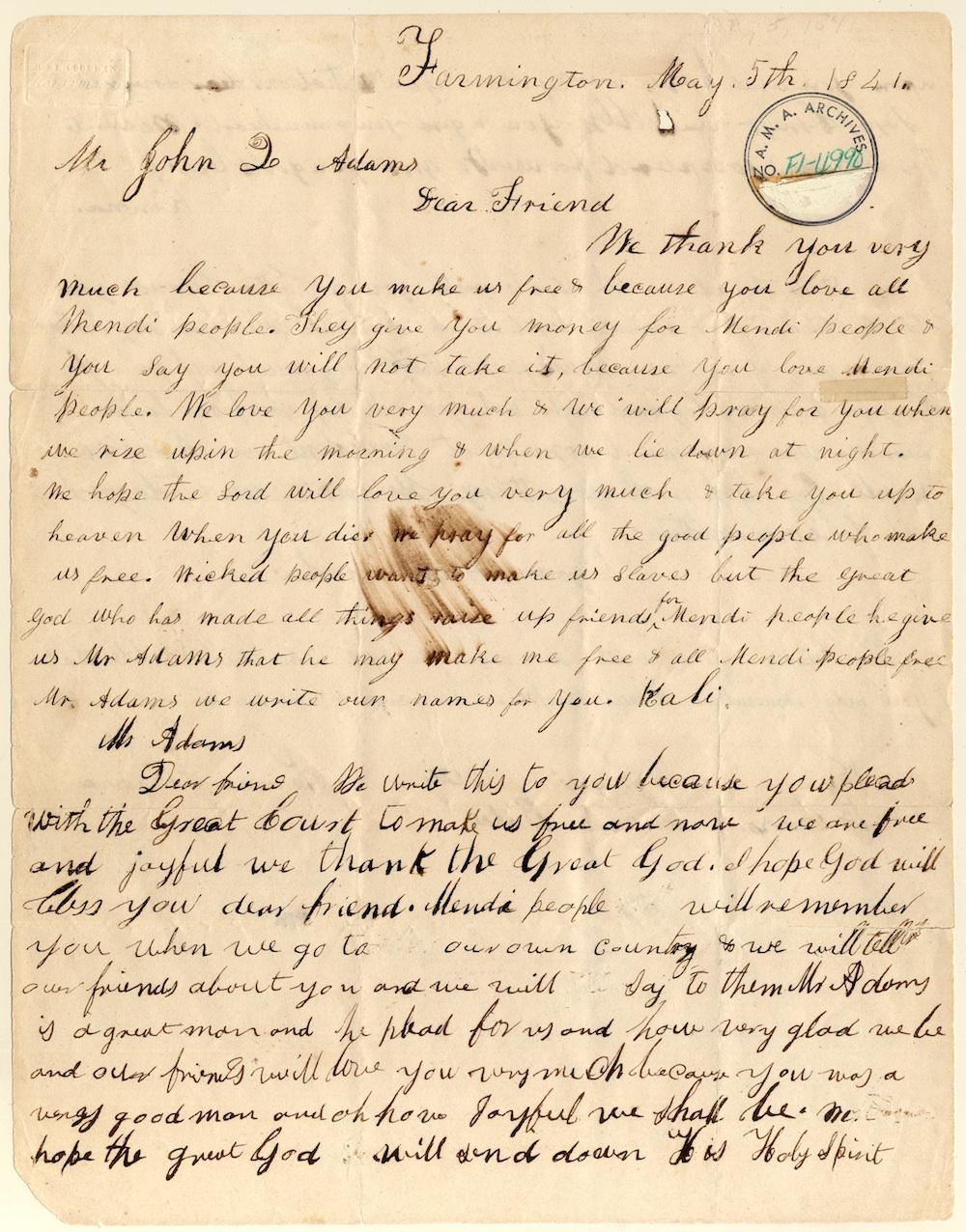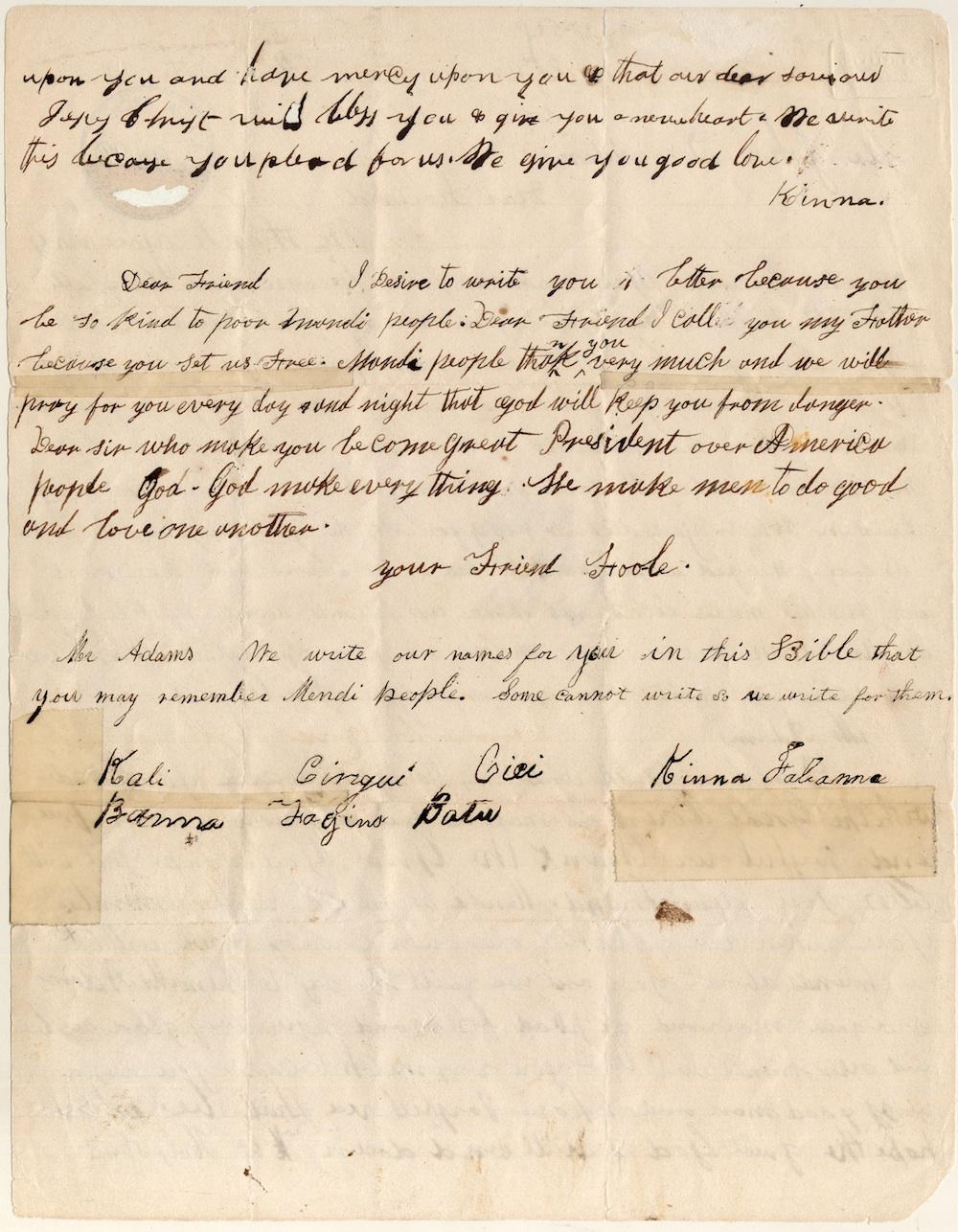The Vault is Slate’s history blog. Like us on Facebook, follow us on Twitter @slatevault, and find us on Tumblr. Find out more about what this space is all about here.
This month marks the 175th anniversary of the Amistad rebellion. On July 1, 1839, 53 Africans, kidnapped into slavery in Sierra Leone, rose up to challenge their Cuban captors. Discovered after the ship ran ashore in Long Island, the group was held in New England for two years, while the courts decided how to handle their case.
This letter, sent from a group of those “Amistads” to former President John Quincy Adams, served as a “thank-you” to the 74-year-old lawyer, who helped argue their case in front of the Supreme Court in March, 1841. As the second page mentions, a Bible accompanied the letter.
The religious language of this letter shows the influence of Lewis Tappan, abolitionist and advocate for the “Amistads,” who converted many of the captives while they were awaiting trial (and hoped that they might bring Christianity to Sierra Leone when they eventually returned). Tappan also helped arrange to teach the captives English—a language some of them mastered quickly enough to write this note.
30 of the 53 rebels made it back to Sierra Leone, the others having died at sea or of diseases or mishaps in New England while awaiting trial. In the end, few of them stuck with the Christian mission founded by the Americans who accompanied them, choosing instead to return to their lives in Mendeland.
My transcript follows the letter images.

American Missionary Association Archives, Amistad Research Center at Tulane Unversity, New Orleans, Louisiana.

American Missionary Association Archives, Amistad Research Center at Tulane University, New Orleans, Louisiana.
My transcript:
Farmington. May 5th 1841.
Mr John Q. Adams
Dear Friend
We thank you very much because you make us free & because you love all Mendi people. They give you money for Mendi people & you say you will not take it, because you love Mendi people. We love you very much & we will pray for you when we rise up in the morning & when we lie down at night. We hope the Lord will love you very much & take you up to heaven when you die. We pray for all the good people who make us free. Wicked people want to make us slaves but the great God who has made all things raise up friends for Mendi people he give us Mr. Adams that he may make me free & all Mendi people free. Mr. Adams we write our names for you. Kali.
Mr. Adams
Dear friend, we write this to you because you plead with the Great Court to make us free and now we are free and joyful we thank the Great God. I hope God will bless you dear friend. Mendi people will remember you when we go to our own country & we will tell all our friends about you and we will say to them Mr. Adams is a great man and he plead for us and how very glad we be and our friends will love you very much because you was a very good man and oh how joyful we shall be. We [?] hope the great God will send down His Holy Spirit upon you and have mercy upon you & that our dear savior Jesus Christ will bless you & give you a new heart & [?] this because you plead for us. We give you good love. Kinna.
Dear Friend
I desire to write you a letter because you be so kind to poor Mendi people. Dear Friend I called you my Father because you set us free. Mendi people thank you very much and we will pray for you every day & night that God will keep you from danger. Dear Sir who make you to become great President over America people God – God make everything. He make men to do good and love one another. Your friend Foole.
Mr Adams We write our names for you in this Bible that you may remember Mendi people. Some cannot write so we write for them.
Kali Cinqui Cici Kinna Faliama
Barma Tagino Batu